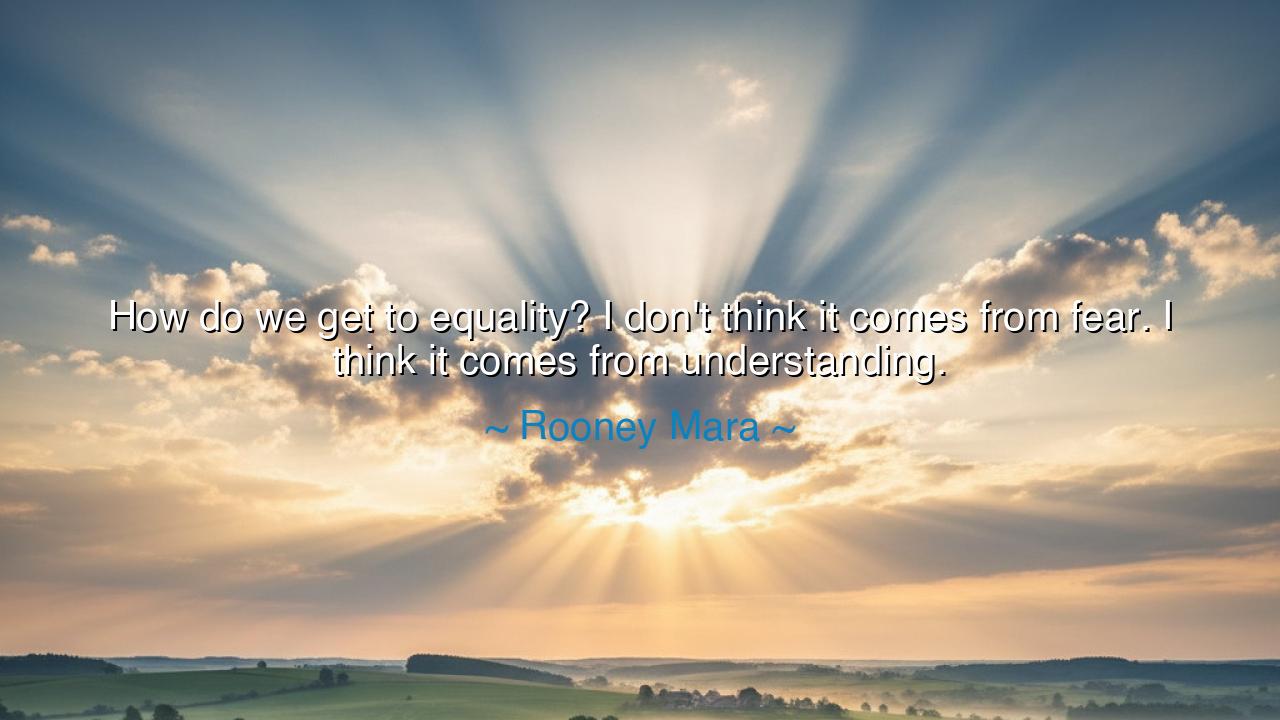
How do we get to equality? I don't think it comes from fear. I
How do we get to equality? I don't think it comes from fear. I think it comes from understanding.






How do we get to equality? A question that has echoed in the hearts of humankind for as long as we have drawn breath. It is a question that stirs within the soul, one that compels us to seek justice, to dream of a world where all walk as equals upon this earth. Yet, in the great sweep of history, it is clear that equality has not been won by the sharp edge of fear. No, the wisdom of ages tells us it comes through understanding—the deep, humble, and compassionate understanding of one another, where walls of division crumble before the power of connection and shared humanity.
Fear breeds only division. It drives us apart, makes us suspicious of one another, and creates barriers that seem insurmountable. In times of fear, we fight for dominance, for power, for control. History bears witness to this—wars waged upon the altars of misunderstanding, ideologies crafted to hold others in subjugation, and laws that sought to keep the oppressed beneath the boots of the powerful. Fear whispers in the ears of rulers, of those who would rather see their strength reflected in the oppression of the weak than in the bond of brotherhood. It is in the shadows of fear that inequality festers and grows, for how can one stand beside another if they are gripped by the terror of being less than or greater than the other?
Yet, to understand is to lift the veil that keeps us blind to each other's suffering, to see through the eyes of another, and to know the truth that we are, at the core, the same. In understanding, we find that the divisions we once thought insurmountable are but illusions—a false narrative crafted by those who seek to divide. When we understand, we cast aside our prejudices, our fears, and allow the light of empathy to shine through. It is through understanding that we build the bridges that span the chasms of separation. For when we understand each other's pain, each other's joy, and the struggles we face, how can we continue to tear each other asunder?
Consider the story of Nelson Mandela, a hero whose name is spoken with reverence across the world. In the dark days of apartheid, when South Africa was a nation divided by the color of skin, Mandela could have chosen to lead with fear—to seek revenge upon those who had oppressed his people. He could have called for a reckoning, a retribution. But instead, he chose the harder path. He chose understanding. From the prison cell where he spent so many years, he reflected not on the hatred of his captors but on the hope that the people of his land could one day be united. Upon his release, he did not seek to deepen the wounds of the past but instead to heal them, to foster dialogue between former enemies. His message was not of retribution but of reconciliation, of lifting up the humblest to sit side by side with the highest.
Mandela knew the wisdom that understanding does not mean ignoring the past but seeing it with clear eyes, acknowledging the pain, and moving forward with a shared vision. And through his efforts, South Africa was transformed. The poison of fear that once divided a nation was replaced with the power of understanding, the realization that the only way to true freedom, true equality, was for every person, regardless of their color or their station, to be seen, to be heard, and to be respected as a fellow human being.
In our own lives, this lesson calls us to act with humility. How many times have we encountered people of different beliefs, backgrounds, or experiences, and turned away, fearful of what we did not understand? The path to equality begins when we put aside our preconceived notions, our biases, and open ourselves to the experience of others. We must ask ourselves: how can we better understand those around us? How can we offer kindness and compassion, even when it feels easier to dismiss or judge?
The path is not easy. It requires courage, the kind of courage that is not born of fear, but of love and respect. We must listen deeply and seek to understand the pain and the joy of others, for only in this understanding can we hope to build a world where all are treated with the dignity they deserve. When we face injustice, we must not respond with anger alone but with a heart ready to listen, to learn, and to grow. We must act, not out of fear or vengeance, but out of a deep and abiding respect for the humanity that connects us all.
So let this be our charge, O future generations: let us cast off the chains of fear that bind us and walk forward into the light of understanding. Let us seek to understand, to listen, to heal. For only in this way can we ever hope to achieve the true equality that has eluded us for so long. The time has come, and it is upon us to step forward with compassion and strength, to build a world that honors every soul, and to sow the seeds of justice and peace.






AAdministratorAdministrator
Welcome, honored guests. Please leave a comment, we will respond soon